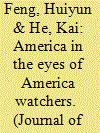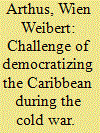| Srl | Item |
| 1 |
ID:
137365


|
|
|
|
|
| Summary/Abstract |
Based on an original survey conducted in the summer of 2012 in Beijing, we examine how China's America watchers—IR scholars who work on US-China relations—have viewed China's power status in the international system, US-China relations and some specific US policies in Asia. Our survey shows that almost half of the survey participants thought that America would remain the global hegemon in the next ten years. Meanwhile, a large majority was also optimistic that China is a rising great power, especially in the economic sense, in the world. More than half of the respondents saw Asian military issues, such as the South China Sea issue, as the most difficult problem between China and the US.
|
|
|
|
|
|
|
|
|
|
|
|
|
|
|
|
| 2 |
ID:
139164


|
|
|
|
|
| Summary/Abstract |
This article examines the course of U.S.–Caribbean relations during the Kennedy years, considering Haiti as a case study. During the first year of Kennedy’s presidency, the U.S. policy toward Haiti was ambivalent. Duvalier’s regime displeased Kennedy since the beginning. Nevertheless, fear of Communism caused him to take a laissez-faire approach to the Haitian situation. The Haitian dictator was a Western ally in the Cold War, and U.S. intelligence believed that Castro or Haitian Communists could benefit from his removal. Starting in 1962, Kennedy did not hide his revulsion for the Haitian dictator. Cold War consideration, again, motivated his shift to an open and hostile position toward Duvalier. U.S. officials were afraid that Duvalier’s dictatorship would provoke a Communist revolution in Haiti. Factors that had been an asset to Duvalier led to his undoing. Kennedy, therefore, was resolute to bring a political change in Haiti and decided the best means would be Duvalier’s demise. However, U.S. limited economic sanction and incomplete military actions were insufficient to bend Duvalier. This study helps verify the reference of “the most dangerous area in the world” attributed to the Caribbean and Latin America during the Cold War era.
|
|
|
|
|
|
|
|
|
|
|
|
|
|
|
|